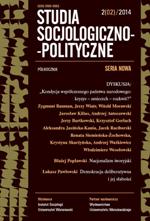Demokracja deliberatywna i jej słabości
Deliberative Democracy and Its Weaknesses
Author(s): Łukasz PawłowskiSubject(s): Social Sciences
Published by: Wydawnictwa Uniwersytetu Warszawskiego
Keywords: demokracja deliberatywna; reprezentacja polityczna; demokratyzacja; suwerenność; granice deliberacji; kryzys demokracji; sondaż deliberatywny; deliberative democracy; political representation; democratization; sovereignty; limits of deliberation
Summary/Abstract: The aim of the article is to present and critically discuss the theory of deliberative democracy in light of its potential to replace the current model of representative democracy. The author believes that whereas deliberation can be an important supplement to any democratic system – improving the quality of political life as well as increasing civic activity – deliberative democracy is not a comprehensive doctrine offering an alternative to institutions of political representation. The article underlines both theoretical and practical difficulties in realizing the deliberative ideal in its more ambitious, comprehensive form. Theoretical weaknesses of deliberative democracy lay in many critically important, yet unresolved questions, e.g. what are the limits of deliberation, i.e. which issues and by whom may be deliberated upon?; how one should arrive at political decisions – by means of simple voting or by reaching an unanimous consensus?; what will be the status of such decisions, i.e. will they be subject to renegotiation and if so, under what conditions? The discussion on practical challenges in realizing the deliberative ideal focuses on James Fishkin’s Deliberative Poll – the most ambitious project of this kind undertaken so far.
Journal: Studia Socjologiczno-Polityczne. Seria Nowa
- Issue Year: 2/2014
- Issue No: 2
- Page Range: 59-86
- Page Count: 28
- Language: Polish

